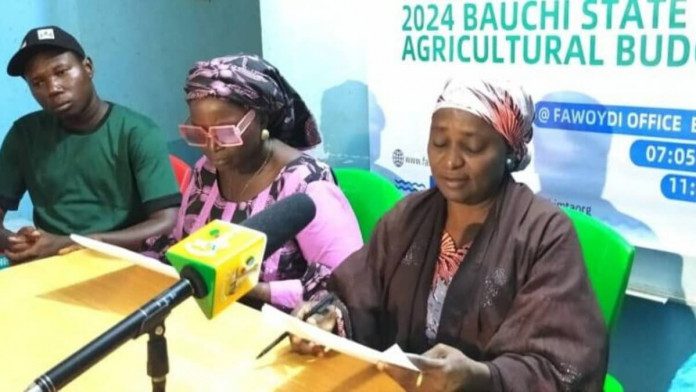News in Brief:
– A coalition of NGOs in Bauchi state, Nigeria, urged the government to address challenges faced by women farmers who produce most of the state’s food.
– The women lack storage, processing facilities, market access, and transportation, leading to high post-harvest losses.
The Bauchi State Public Finance of Agriculture (PFA) budget committee, a coalition of civil society organisations (CSOs), has called on the state government to address significant challenges faced by female farmers.
The committee, led by Chairperson Tabawa Atiku, presented their findings at a press conference on the analysis of the 2024 Bauchi state agricultural budget.
Atiku noted the limited access of smallholder women farmers to essential resources. These limitations include a lack of storage and processing facilities, market access, training opportunities, and transportation for their produce, particularly in flood-prone and remote areas.
Furthermore, data presented by the committee revealed that women farmers have insufficient access to these critical resources, with percentages ranging from just 42.3% for training to a mere 9.6% for produce transportation.
Additionally, the committee urged the state government to invest in storage and processing facilities to minimise post-harvest losses. They proposed the establishment of at least 2,500 storage drums across the state’s 20 local government areas.
Also, they advocated for the revitalisation of existing, dormant storage facilities at various local government headquarters. Improved access roads in flood-prone and remote areas were also highlighted as a necessity for enhanced market access for women farmers.
Climate resilience and budgetary concerns
Furthermore, the committee stressed the importance of climate-resilient sustainable agriculture (CRSA) practices and agroecology. They urged budgetary allocations for climate change mitigation initiatives and the promotion of agroecology to ensure long-term food production sustainability within the state.
Training programs for women farmers on climate resilience and encouraging tree planting were identified as crucial measures.
Also, the committee stressed the need for dedicated budget allocations to disseminate timely weather forecasts and climate information to farmers to facilitate informed decision-making regarding farm preparation and crop planning.
Interestingly, a critical point raised by the committee was the meagre allocation to the state’s agricultural sector. With agriculture receiving only ₦4.4 billion of the ₦300 billion total state budget (approximately 1.5%), they stated that achieving the 10% Malabo Declaration target for agricultural spending remains a challenge.
The committee highlighted that this shortfall hinders progress towards achieving Sustainable Development Goals (SDGs) 1 (No Poverty), 2 (Zero Hunger and Food Security), and 3 (Good Health and Well-being) at the state level.
Finally, the press conference concluded with a call for collaboration between the state government and relevant stakeholders to address the challenges faced by smallholder women farmers.
The CSOs involved in the PFA budget committee include Fahimta Women and Youth Development Initiative (FAWOYDI), Rahama Women and Development Programme (RAHAMA), and Women Empowerment Initiative Nigeria (WEIN), among others.



